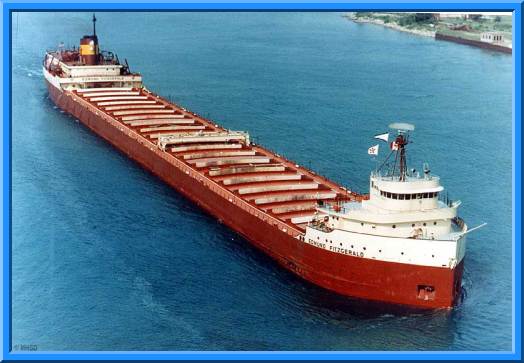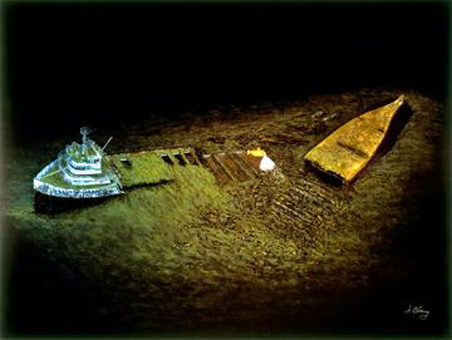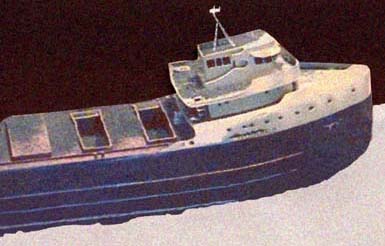Computers and Laptops let music load
Wreck of the Edmond Fitzgerald
Sunk November 10, 1975
Song by Gordon Lightfoot

The SS Edmund Fitzgerald was an American Great Lakes freighter that made headlines after sinking in a Lake Superior storm on November 10, 1975, with the loss of the entire crew of 29. When launched on June 8, 1958, she was the largest boat on North America's Great Lakes, and she remains the largest boat to have sunk there. Nicknamed the "Mighty Fitz", "Fitz", or "Big Fitz", the ship suffered a series of mishaps during her launch: it took three attempts to break the champagne bottle used to christen her, and she collided with a pier when she entered the water.
For seventeen years the Fitzgerald carried taconite iron ore from mines near Duluth, Minnesota, to iron works in Detroit, Toledo, and other Great Lakes ports. As a "workhorse" she set seasonal haul records six times, often beating her own previous record. Her size, record-breaking performance, and "DJ captain" endeared the Fitzgerald to boat watchers. Captain Peter Pulcer was known for piping music day or night over the ship's intercom system while passing through the St. Clair and Detroit Rivers (between Lakes Huron and Erie), and entertaining spectators at the Soo Locks (between Lakes Superior and Huron) with a running commentary about the Fitzgerald.
Carrying a full cargo of taconite ore pellets with Captain Ernest M. McSorley in command, the Edmund Fitzgerald embarked on her final voyage from Superior, Wisconsin (near Duluth), on the afternoon of November 9, 1975. En route to a steel mill near Detroit, Michigan, she joined a second freighter, the SS Arthur M. Anderson. By the next day the two ships were caught in the midst of a massive winter storm on Lake Superior, with near hurricane-force winds and waves up to 35 feet (11 m) high. Shortly after 7:10 p.m. the Fitzgerald suddenly sank in Canadian waters 530 feet (160 m) deep, approximately 17 miles (15 nautical miles; 27 kilometers) from the entrance to Whitefish Bay near the twin cities of Sault Ste. Marie, Michigan and Sault Ste. Marie, Ontario. Although the Fitzgerald had reported being in difficulty earlier, no distress signals were sent before she sank. Her crew of 29 all perished, and no bodies were recovered.

Many theories, books, studies and expeditions have examined the cause of the sinking. The Fitzgerald may have fallen victim to the high waves of the storm, suffered structural failure, been swamped with water entering through her cargo hatches or deck, experienced topside damage, or shoaled in a shallow part of Lake Superior. The sinking of the Edmund Fitzgerald is one of the best-known disasters in the history of Great Lakes shipping. Gordon Lightfoot made it the subject of his 1976 hit song "The Wreck of the Edmund Fitzgerald".
The brave men who were lost that night:
Captain Ernest M. McSorley - Michael E. Armagost - Fred J. Beetcher - Thomas D. Bentsen
Edward F. Bindon - Thomas D. Borgeson - Oliver J. Champeau - Nolan S. Church
Ransom E. Cundy - Thomas E. Edwards - Russell G. Haskell - George J. Holl
Bruce L. Hudson - Allen G. Kalmon - Gorden Maclellan - Joseph Mazes
John H. McCarthy - Eugene O'Brien - Karl A. Peckol - John J. Poviach
James A. Pratt - Robert C. Rafferty - Paul M. Rippa - John D. Simmons
William J. Spengler - Mark A. Thomas - Ralph G. Walton - David E. Weiss
Blaine H. Wilhelm

Music for Firefox, Tablet pc, Android Smartphones users

"Wreck Of The Edmund Fitzgerald"
Music and lyrics ©1976 by Gordon Lightfoot
The legend lives on from the Chippewa on down
of the big lake they called "Gitche Gumee."
The lake, it is said, never gives up her dead
when the skies of November turn gloomy.
With a load of iron ore twenty-six thousand tons more
than the Edmund Fitzgerald weighed empty,
that good ship and true was a bone to be chewed
when the "Gales of November" came early.
The ship was the pride of the American side
coming back from some mill in Wisconsin.
As the big freighters go, it was bigger than most
with a crew and good captain well seasoned,
concluding some terms with a couple of steel firms
when they left fully loaded for Cleveland.
And later that night when the ship's bell rang,
could it be the north wind they'd been feelin'?
The wind in the wires made a tattle-tale sound
and a wave broke over the railing.
And ev'ry man knew, as the captain did too
'twas the witch of November come stealin'.
The dawn came late and the breakfast had to wait
when the Gales of November came slashin'.
When afternoon came it was freezin' rain
in the face of a hurricane west wind.
When suppertime came the old cook came on deck sayin'.
"Fellas, it's too rough t'feed ya."
At seven P.M. a main hatchway caved in; he said,
(*2010 lyric change: At 7 p.m., it grew dark, it was then he said,)
"Fellas, it's bin good t'know ya!"
The captain wired in he had water comin' in
and the good ship and crew was in peril.
And later that night when 'is lights went outta sight
came the wreck of the Edmund Fitzgerald.
Does any one know where the love of God goes
when the waves turn the minutes to hours?
The searchers all say they'd have made Whitefish Bay
if they'd put fifteen more miles behind 'er.
They might have split up or they might have capsized;
they may have broke deep and took water.
And all that remains is the faces and the names
of the wives and the sons and the daughters.
Lake Huron rolls, Superior sings
in the rooms of her ice-water mansion.
Old Michigan steams like a young man's dreams;
the islands and bays are for sportsmen.
And farther below Lake Ontario
takes in what Lake Erie can send her,
And the iron boats go as the mariners all know
with the Gales of November remembered.
In a musty old hall in Detroit they prayed,
in the "Maritime Sailors' Cathedral."
The church bell chimed 'til it rang twenty-nine times
for each man on the Edmund Fitzgerald.
The legend lives on from the Chippewa on down
of the big lake they call "Gitche Gumee."
"Superior," they said, "never gives up her dead
when the gales of November come early!"
<bgsound src="/music/oftheedmundfitzgerald.wav" loop="infinite">
EMAIL:
richards.page.creations
~~Click below for my main web site ~~






